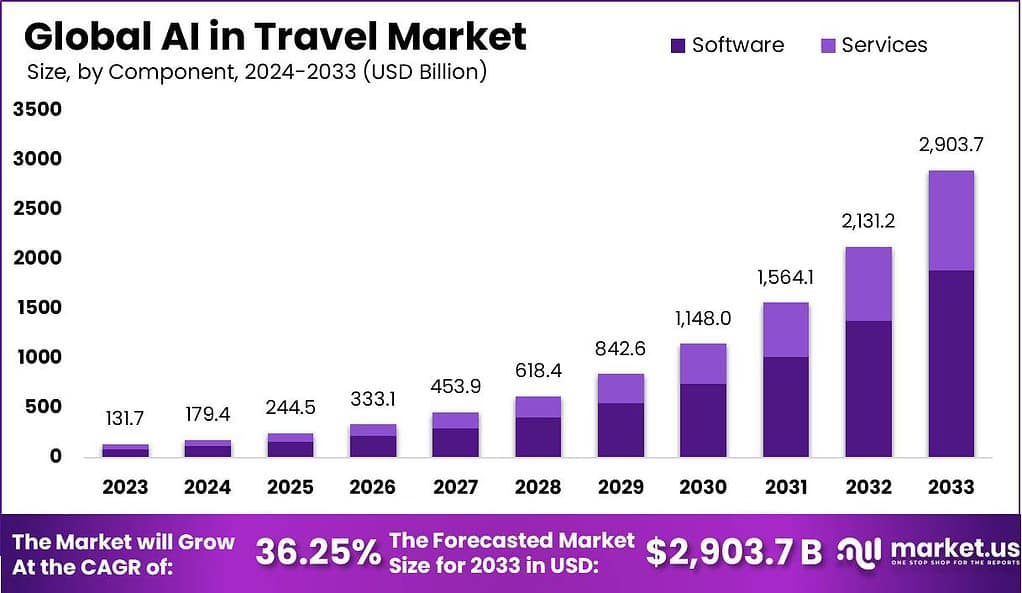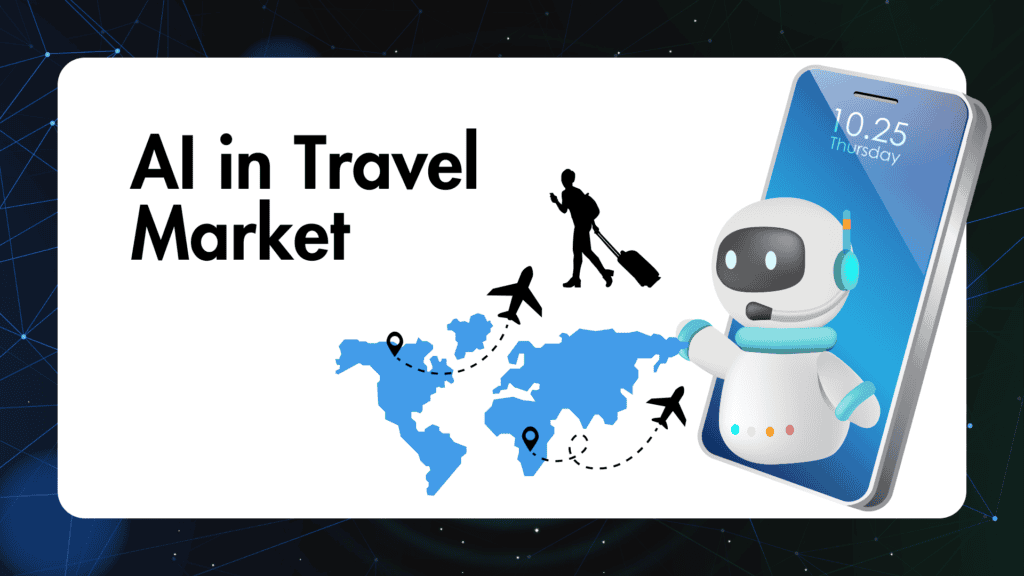Introduction
According to Market.us, The Global AI in Travel Market is expanding at an exceptional pace as the industry leverages artificial intelligence to improve personalization, operational efficiency, and customer engagement. Valued at USD 131.7 Billion in 2023, the market is projected to reach nearly USD 2,903.7 Billion by 2033, advancing at a strong CAGR of 36.25% from 2024 to 2033. Growth is being fueled by the adoption of AI-powered chatbots, predictive analytics for demand forecasting, and intelligent automation that enhances booking experiences and streamlines travel management.
The AI in Travel Market focuses on the use of advanced artificial intelligence technologies to transform the travel and tourism industry. AI applications in this market enable automated and personalized travel planning, booking, customer service, and operational optimization. By leveraging AI, travel companies can offer highly tailored experiences, real-time updates, dynamic pricing, and efficient resource management, creating smoother and more engaging journeys for travelers. This market spans various segments including airlines, hotels, online travel agencies, and tour operators aiming to improve both customer satisfaction and operational efficiency.
Top driving factors include rapid digitization of the travel industry, increasing consumer demand for personalized travel experiences, and the need for smarter decision-making tools in managing travel logistics. Advances in machine learning, natural language processing, and generative AI accelerate the integration of virtual travel assistants, personalized recommendations, and dynamic pricing models. The growing adoption of mobile and online booking platforms also fuels AI-driven service offerings that enhance convenience and responsiveness for travelers. Furthermore, rising competition encourages travel businesses to differentiate by incorporating intelligent automation and AI capabilities.

Key Insights Summary
- The market was valued at USD 131.7 Billion in 2023.
- It is projected to reach USD 2,903.7 Billion by 2033, growing at a strong CAGR of 36.25%.
- In 2023, the Software segment led the market, capturing more than 65% share, driven by AI-powered platforms and solutions.
- The Cloud-based segment dominated deployment with over 61% share, reflecting demand for scalable and flexible travel applications.
- The Customer Service segment held the largest application share at 25.1%, supported by AI chatbots, booking assistants, and automated query handling.
- North America was the leading region in 2023, holding 34.5% share and generating USD 45.4 Billion in revenue.
Demand analysis shows growing reliance on AI-powered tools by travelers and travel operators alike. Over 60% of travelers globally are open to using AI solutions for trip planning, while leisure and business travelers increasingly utilize AI platforms for price comparisons, itinerary customization, and booking automation. Enterprises benefit through optimized inventory management, better forecasting of travel demand, and improved customer engagement. AI’s role in predictive analytics also helps companies anticipate disruptions and optimize route planning, leading to enhanced operational resilience and customer satisfaction.
Key technologies advancing adoption include generative AI models for content creation and itinerary development, AI chatbots and virtual assistants for customer interaction, predictive analytics for price optimization, and facial recognition for enhanced security. Cloud computing supports scalable AI deployments, while IoT and data analytics provide rich inputs for personalized recommendations and operational efficiency. The combination of these technologies creates an AI ecosystem that continuously learns and adapts to traveler preferences and market conditions.
The primary reasons for adopting AI in travel are to improve personalization, increase operational efficiency, enhance customer service, and enable proactive decision-making. AI allows travel companies to deliver customized offerings that match individual traveler preferences and behaviors, increasing loyalty and satisfaction. Automation reduces manual workloads, enabling faster response times and lowering costs. Real-time insights and predictive capabilities empower businesses to optimize pricing, inventory, and route management while minimizing disruptions, all of which contribute to improved profitability and service levels.
Investment opportunities abound in AI development focused on enhancing traveler experience through smarter chatbots, dynamic pricing tools, and AI-enabled travel agents. Significant funding targets machine learning startups innovating in predictive analytics, voice-enabled assistants, and AI-driven itinerary planners. The rise of generative AI opens new possibilities in marketing content creation and personalized digital travel content. Emerging markets with increasing internet penetration and mobile usage also present attractive expansion areas for AI-enabled travel platforms and services.
Business benefits from AI adoption in travel include increased revenue through optimized pricing, enhanced customer engagement, streamlined operations, and reduced overhead costs. AI tools facilitate better resource utilization, faster issue resolution, improved safety, and more accurate forecasting. Travel companies gain competitive advantage by leveraging AI to meet evolving consumer expectations and market demands. Additionally, AI supports sustainability goals by optimizing travel routes and reducing unnecessary resource consumption.
Driver Factor of AI in Travel
One of the key drivers behind the adoption of artificial intelligence in the travel industry is its ability to provide personalized and dynamic travel experiences. AI-powered tools analyze vast amounts of data, such as traveler preferences, booking history, and real-time events, to create customized itineraries and recommendations tailored to individual needs.
This capability not only enhances customer satisfaction but also leads to higher booking conversion rates for travel businesses. For example, travel platforms like Booking.com leverage AI to offer natural language search and finely filtered choices that align closely with what travelers want at each stage of their planning journey.
Moreover, AI helps travel companies operate more efficiently by automating routine tasks such as managing bookings, responding to inquiries, and dynamic pricing optimization. Automation reduces operational costs and staff workload while enabling faster and more accurate service delivery. Airlines, hotels, and travel agencies employ AI-driven chatbots and virtual assistants to handle a growing volume of customer interactions seamlessly 24/7, improving responsiveness and scalability.
Restraint Factor
Despite its many benefits, the travel industry faces a significant restraint in implementing AI solutions due to the complexity of integration and lack of sufficient internal talent. Many travel organizations find it challenging to incorporate AI technologies into their existing systems, partly because of legacy IT infrastructure and insufficient skilled personnel to manage and optimize AI applications. This complexity can slow down AI adoption and limit the potential gains from the technology.
Additionally, budget limitations constrain AI investments, especially for small and medium-sized travel businesses. High costs related to AI development, deployment, and continuous improvement deter some companies from fully leveraging AI’s capabilities. As a result, the uneven pace of AI adoption across the industry can hinder the realization of widespread benefits, leaving some companies at a competitive disadvantage.
Opportunity Analysis
AI presents a significant opportunity for the travel industry to enhance risk management and traveler safety through real-time monitoring and predictive analytics. By analyzing global risk factors, geopolitical events, and traveler profiles, AI systems can provide personalized safety alerts and adjust travel plans proactively. This capability not only helps travelers avoid disruptive or dangerous situations but also builds trust and confidence in travel services that prioritize customer security.
Furthermore, AI-driven market insights offer an opportunity for better pricing strategies and resource allocation. Advanced algorithms analyze data from multiple sources such as seasonal demand patterns, competitor pricing, and social sentiment to optimize prices dynamically. This leads to increased revenue and operational efficiency for travel businesses, as seen in global hotel chains like Marriott, which reported significant improvements in revenue per available room using AI pricing models.
Challenge Analysis
One of the main challenges in AI adoption for travel is maintaining the delicate balance between automation and human intervention. While AI can process large datasets and provide instant responses, it lacks the human ability to understand emotions, cultural sensitivities, and nuanced ethical decisions that are crucial in certain travel scenarios. For example, decisions around traveler safety inherently involve subjective judgment that AI alone cannot fully replicate.
Another challenge is data privacy concerns and regulatory compliance. Travel companies collect and process vast amounts of sensitive traveler information to power their AI systems, raising issues about data protection and adherence to privacy laws. Ensuring AI algorithms remain transparent, fair, and secure while delivering personalized services poses an ongoing challenge for the industry.
Key Market Segments
By Component
- Software
- Services
By Deployment mode
- On-premises
- Cloud-based
By Application
- Customer Service
- Booking and Reservations
- Travel Planning and Personalization
- Marketing and Advertising
- Operations Management
- Security and Fraud Detection
Top Key Players in the Market
- Amadeus
- Expedia Group
- com
- Sabre
- Airbnb
- Skyscanner
- Kayak
- TripActions
- Hopper
- TravelPerk
- Agoda
- Google Travel
- Cleartrip
- MakeMyTrip
- CWT
- Other Key Players












